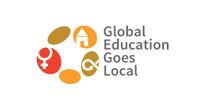Global Education Goes Local (GEGL): Difference between revisions
No edit summary |
No edit summary |
||
| Line 16: | Line 16: | ||
'''Global Education Goes Local''' is a 36-month, international project supported through the Non-state Actors and Local Authorities Development Programme of the European Union ([[EuropeAid]]). | '''Global Education Goes Local''' is a 36-month, international project supported through the Non-state Actors and Local Authorities Development Programme of the European Union ([[EuropeAid]]). | ||
This project is being implemented in Cyprus by the Future Worlds Center, Bulgaria by the [[C.E.G.A. Foundation]], Austria by [[Suedwind Steiermark]], Lithuania by [[Global Citizens’ Academy/GCA]], Slovenia by [[Institute for African Studies/IAS]], and Spain by [[Cazalla Intercultural]]. | This project is being implemented in Cyprus by the [[Future Worlds Center]], Bulgaria by the [[C.E.G.A. Foundation]], Austria by [[Suedwind Steiermark]], Lithuania by [[Global Citizens’ Academy/GCA]], Slovenia by [[Institute for African Studies/IAS]], and Spain by [[Cazalla Intercultural]]. | ||
==Overall objectives== | ==Overall objectives== | ||
Revision as of 05:53, 25 April 2018
|
Global Education Goes Local is a 36-month, international project supported through the Non-state Actors and Local Authorities Development Programme of the European Union (EuropeAid).
This project is being implemented in Cyprus by the Future Worlds Center, Bulgaria by the C.E.G.A. Foundation, Austria by Suedwind Steiermark, Lithuania by Global Citizens’ Academy/GCA, Slovenia by Institute for African Studies/IAS, and Spain by Cazalla Intercultural.
Overall objectives
The overall objective of the project is to foster commitment of European citizens to take an active role towards meeting the challenges of the interdependent world we live in, based on awareness and critical understanding of their two-way relations with the issues of global development. Sustainable Development Goals (SDGs) are a universal call to action to end poverty, protect the planet and ensure that all people enjoy peace and prosperity (see here). GEGL focuses on the following SDGs:
- 5: Gender Equality
- 11: Sustainable Cities and Communities
- 12: Responsible Consumption and Production
Specific objectives
- To foster the understanding of the interconnectedness between the developing countries and the European Union on the successful implementation of the SDGs with focus on goals 5, 11 and 12 among European citizens living in small localities;
- To increase the awareness of citizens in small localities, and especially young people, on the local and global dimensions of the SDGs with focus on goals 5, 11 and 12;
- To generate and promote new approaches and methodologies of engaging young people in global issues, particularly by utilising pop culture;
- To build capacity of actors in small localities to run quality global learning process with local communities and especially young people.
Target Groups
Educational and community bodies in small localities
General population in small localities
Young People in small localities (14-30 years old)
Activities
Expected Results
- Awareness and commitment on global issues connected to SDGs 5, 11 and 12 significantly increased in 30 small localities;
- Citizens in 30 small localities and especially young people engaged in learning and action around global issues;
- Innovative aproaches on engaging young people in global learning (connected to SDGs 5, 11 and 12) developed, tested and disseminated;
- Increased cappacity and competences among stakeholders on local level to further utilise global learning with local communities;
- Improved understanding of policy makers and influencers at local and national level for the value and approaches of global learning
